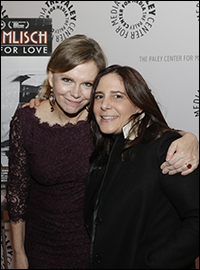
Marvin Hamlisch, who by the age of 31 had won a Tony, three Oscars, four Emmys and a Pulitzer, died during the summer of 2012 at the age of 68. Hamlisch's life and times, as well as his successes and failures, are examined in "Marvin Hamlisch: What He Did for Love," which will premiere on the PBS American Masters series Dec. 27. Taking a cue from her subject, Dori Berinstein's documentary is filled tot he brim with his music and his irrepressible zest for living.
The coddled son of a pair of Austrian immigrants — the father was a professional accordionist in the old country — Hamlisch was born in New York in 1944. His mother, who makes numerous appearances in the documentary through film clips, insists that he was listening to music and beating out the rhythms in his crib when he was eight — eight months, that is. At six-and-a-half years old, he was admitted to Juilliard as an apparent prodigy. Instead of playing Mozart for his audition, he tells us, he played the pop song "I'm Yours" — but he demonstrated that he could play it in any and all keys. Groomed to be the next Vladimir Horowitz, Hamlisch quickly realized that he wasn't interested in classical music. The contemporary world was his area, and Broadway was the goal.
Hamlisch's early musical facility and destined-for-greatness enthusiasm is attested to in comments from classmates at Juilliard and Professional Children's School, including Lorin Hollander (the pianist), Christopher Walken and Leslie Uggams. As a teenager, he wrote a song for the girlfriend of a classmate who wanted to make a private record to prove to her mother that she could sing. That was, of course, Liza with a "Z." At 19, the musically-adept prodigy got a job as rehearsal pianist for a new Broadway show, which starred Barbra without the "A." (Streisand, who offers comments in several sections of the documentary, recalls with delight a day when Marvin — on a rehearsal break — went out to get coffee and brought her back not one but two chocolate donuts.) At the same time, he wrote his first song hit: "Sunshine, Lollipops, and Roses." Quincy Jones explains how he recognized the young Hamlisch's talent and produced the recording.
We follow the composer's early successes in Hollywood, which culminated in his moment of overnight fame: April 2, 1974, when he made three trips to the winner's podium at the Oscars for his work on "The Sting" and "The Way We Were." Then it was back to Broadway, when Michael Bennett asked him to work on the project that was to become A Chorus Line. This 1975 triumph put Hamlisch on top of the entertainment world.
| |
 |
|
| Terre Blair Hamlisch and Dori Berinstein | ||
| Photo by Heidi Gutman |
But the rest of Hamlisch's musicals were quick failures. Film work continued, but he was no longer creating an artistic stir. After the twin 1983 failures of the musicals Smile and Jean Seberg, he was in freefall, wondering — he said — "Did I have any more to give?" (At this point in the documentary, Berenstein inserts a clip of Mama Hamlisch. Talk-show host: Who's your favorite composer? Mama: The truth? Gershwin.)
Hamlisch never again found success on Broadway, despite the intriguing-but-flawed Sweet Smell of Success. Another musical, the Jerry Lewis-helmed Nutty Professor, played a tryout in Nashville in 2012 — opening a week before the composer's death — but has yet to reach New York. He did create a niche of his own as a wildly popular conductor on the symphonic pops circuit. The documentary also tells how he finally found true and enduring love in 1989, when he met and married Terre Blair (who appears to be a perfect steward of the composer's work).
A long list of coworkers and colleagues are present in the film, with warm reminiscences and what seems like a genuine appreciation for their talented and funny friend. These include Donna McKechnie, Baayork Lee, Bob Avian, Robert Klein, Lucie Arnaz, Tim Rice, Melissa Manchester, Rupert Holmes, Steven Soderbergh, Maury Yeston, Nicholas Hytner, John Lithgow, Brian d'Arcy James, Raúl Esparza, Peter Filichia, and Alan and Marilyn Bergman.
"What He Did for Love" ends with a clip from a memorial concert of Klea Blackhurst singing "While I Still Have the Time," from The Nutty Professor. The song does, indeed, sound like another good Hamlisch showtune yet to come our way.






















